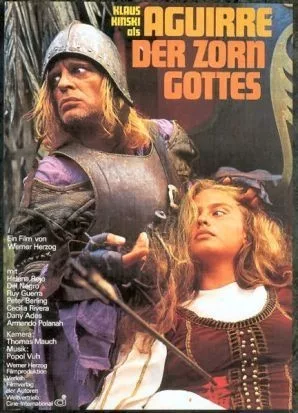Werner Herzog is the most austere of the new German directors, the one most concerned with characters trapped at the extremes of alienation and madness. His films sometimes seem trapped there, too; films like “Fata Morgana” with its images of desolation in the desert are so severe and static they’re almost painful to watch. But in 1972 he made “Aguirre, Wrath of God”, about a doomed expedition in South America, and it’s one of his most accessible (and horrifying) works.
The Aguirre of the title is a member of Hernando Pizarro’s mad 1560 expedition to find EI Dorado, the fabled city of gold. In a series of breathtaking opening images, the members of the expedition pick their way down dizzying paths and push through the steaming jungle, dressed with spectacular inappropriateness in medieval armor. They’re lost in the trackless wilderness, but their eyes burn with an insane zeal; they’re convinced that next day or next week they’ll all be rich as emperors.
Pizarro finally admits defeat and orders Aguirre to lead a search party up the river. He’s to report back in a week. If there’s no word, Pizarro’s group will try to return to their base. Aguirre is played by Klaus Kinski, an actor Herzog has described in an interview as paranoid and schizophrenic (“No one has ever managed to domesticate him”). Whatever his mental state, Kinski invests the film with a frightening intensity. He rules, he kills, he leads, he stares into the camera and we comprehend his secret vision – that he, not Pizarro, will conquer EI Dorado and rule an empire.
Herzog, who filmed entirely on location in Peru, shows Aguirre’s group on rafts floating down the vast river. The vegetation is so dense that it seems almost impossible to penetrate to the shore. Morale is low, and the heat and fever create a dreamlike, morbid state on the rafts. Aguirre selects the most fatuous member of his group and anoints him ”emperor” — possibly because the fact of a ruler will make the nonexistent EI Dorado seem more real.
But the overwhelming reality is death. One by one, members of the expedition are picked off by the Indians of the jungle, who are rarely seen but are always there. Poisoned arrows become a fact of life; soldiers drop in the backgrounds of shots concerned with other things. The protected women of the expedition sit by idly, their status sacred, their duty to wait until it is time to populate the new empire.
Herzog finds images to make the river journey an almost physical reality for us. He shows us, for long stretches of film, the muddy torrent of the waters: They never end, and so the expedition will never come to the end of them. He shows us Aguirre’s burning eyes, his fiercely set face, his willingness to behead a soldier suspected of disloyalty. And he shows us the attrition of the expedition, as one raft is lost to the Indians and the soldiers on the other are slowly defeated by the arrows, the fever and their own madness.
The final images are the most bizarre and affecting of all. Everyone has been killed except Aguirre and his sister. She sits quietly in her dress from Spain, patient, unquestioning, possibly insane. Hundreds of little monkeys come aboard the raft and swarm all over it; the meekest citizens of the jungle boldly announcing their victory over the expedition. Aguirre hardly notices them. He stalks back and forth across the deck, now half awash, vowing that he will personally find EI Dorado, will conquer it single-handedly, will populate it by marrying his sister.
“Aguirre, Wrath of God” is an obsessive film, about obsession. Because it is more or less based on fact, it’s all the more disturbing: Here is what greed and madness can bring human beings to. Herzog’s other films sometimes speak unclearly; this one speaks in blunt, unforgiving despair.




















